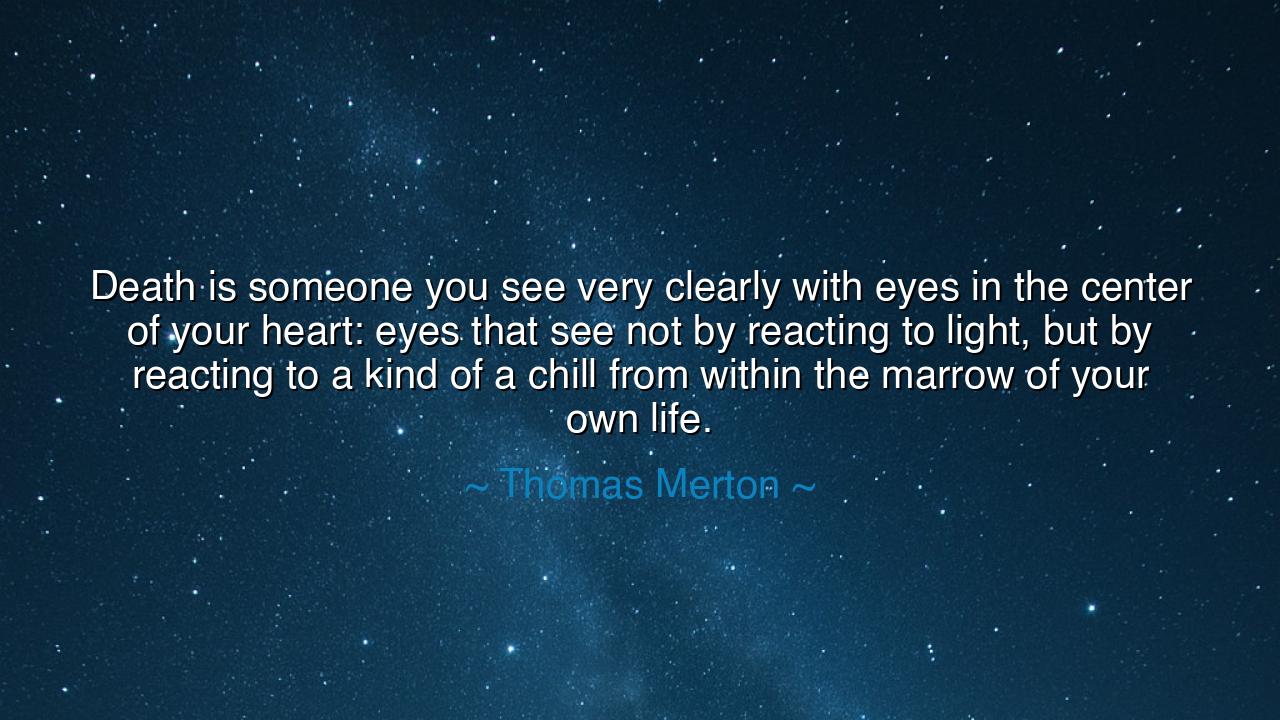
Death is someone you see very clearly with eyes in the center of
Death is someone you see very clearly with eyes in the center of your heart: eyes that see not by reacting to light, but by reacting to a kind of a chill from within the marrow of your own life.






The words of Thomas Merton, “Death is someone you see very clearly with eyes in the center of your heart: eyes that see not by reacting to light, but by reacting to a kind of a chill from within the marrow of your own life,” shimmer with a haunting wisdom that reaches beyond philosophy and into the realm of spiritual revelation. Merton, the Trappist monk and mystic, speaks here not of death as a mere event or a final breath, but as a presence—a silent companion that walks beside each of us from the moment of birth. He teaches that to truly understand life, one must first learn to see death, not with the eyes of the body, but with the eyes of the heart, those inner senses that perceive what lies beyond the reach of flesh and reason.
For Merton, who spent his life in contemplation, solitude, and prayer, death was not the enemy of life—it was its reflection, its completion, its mirror. When he says that we “see it very clearly,” he means that we all, at some deep level, carry an awareness of our own mortality. This knowledge is not learned through books or teaching, but through living itself. The chill in the marrow he speaks of is that subtle tremor within the soul when we encounter silence, loss, or beauty too profound for words. It is the recognition that all things—joy, sorrow, youth, strength—are fleeting. But this awareness, far from bringing despair, brings clarity. It teaches us what truly matters, stripping away the illusions of permanence that blind the living.
To “see with eyes in the center of your heart” is to awaken the spirit—to feel death not as an external force, but as an inner truth. Merton’s vision reminds us that death is not a stranger who comes unannounced, but a teacher who whispers through every passing moment. Each sunset, each wrinkle, each goodbye, is a gentle lesson from this eternal presence. The eyes of the heart, unlike those of the body, do not depend on light—they do not see with logic or proof, but with understanding born from experience, pain, and love. They perceive life’s fragility not as terror, but as tenderness, and through that tenderness, they find peace.
History offers us many souls who have seen with such eyes. Consider Socrates, who, when condemned to die, drank the cup of hemlock with serenity. To him, death was not annihilation but transition—the release of the soul to a higher reality. Or Buddha, who taught that awareness of impermanence is the key to enlightenment. Both, like Merton, understood that death is not a thing to fear, but to know—to know so deeply that it transforms how we live. Those who grasp this truth walk the earth lightly, for they have already made peace with the inevitable.
Merton’s insight also reflects his monastic life—a life of silence, simplicity, and inward vision. In the stillness of the abbey, where the noise of the world fades and time slows to the rhythm of prayer, one begins to sense the quiet pulse of eternity. The chill from within the marrow is not a terror, but a sacred awareness that life is passing through us like wind through reeds. To the mystic, such awareness is not darkness but illumination—the recognition that all things are connected in the great mystery of being. Death ceases to be an ending and becomes a doorway, a continuation of the divine journey.
Yet, Merton’s words are not meant only for monks or saints. They are a call to each of us, living in the noise and haste of the modern world, to pause and feel the depth of our own existence. Too often we flee from thoughts of death, drowning them in distraction. But to ignore mortality is to live shallowly. When we dare to look with the eyes of the heart, we discover that death gives life its shape, its urgency, its beauty. Without it, love would lose its sweetness, time its meaning, and compassion its necessity. Awareness of our fragility deepens gratitude for each breath, each moment shared, each act of kindness.
The lesson, then, is this: do not fear death—understand it. Sit with it as one sits with a wise elder. Let it teach you how to live. When you feel the chill from the marrow of your life, do not turn away, for it is the reminder that your time is precious and your soul eternal. Live in such a way that, when your final hour comes, you may greet it not as a thief, but as an old friend long awaited. Love deeply. Forgive swiftly. Create beauty. Speak truth. Walk gently upon the earth, knowing that each heartbeat is a gift borrowed from eternity.
For in the end, as Thomas Merton reminds us, to see death clearly is not to lose hope—it is to awaken fully. When one learns to see through the eyes of the heart, life becomes radiant with meaning, and death, that ancient shadow, is revealed not as the end of light, but as its completion. Thus, the wise live not in fear, but in reverence—for they know that the same mystery that takes us away also sustains us while we are here.






AAdministratorAdministrator
Welcome, honored guests. Please leave a comment, we will respond soon